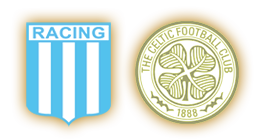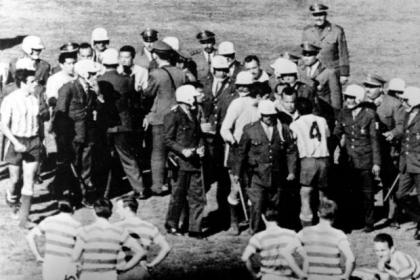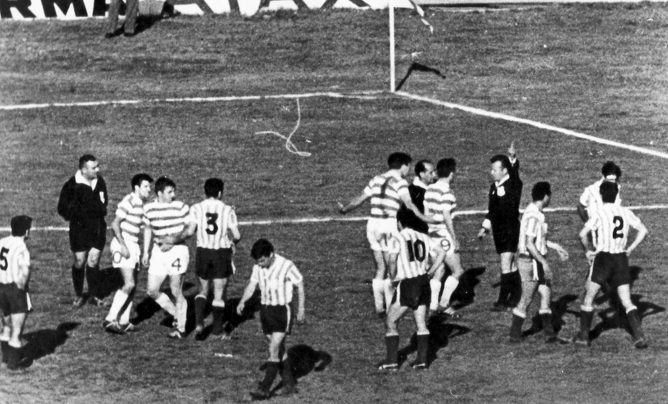1st November – Evening
As we sat in the dining room of the Hindu Club, trying to come to terms with the events of the afternoon, we wondered why the Board were either not there at all or else going in and out of the room on a regular basis. What we did not know at the time – because no one on the management side or the Board obviously thought us worthy of being involved – was that that the Board, the management and the Argentinian officials were in serious talks about the next stage in the World Club Championship.
As we found out from the press later, the Celtic Board had already sent a telegram to UEFA, explaining that firstly our goalkeeper had been injured by a missile thrown on to the field just before the kick-off; secondly, that the South American officials seemed to be apparently unconcerned about this and other incidents; and thirdly, they strongly urged UEFA to send an observer for the third match.
At that point, the Board had to decide whether to take on the third match in Montevideo or just pull out of the whole competition. What exactly happened was never made public. Oh! there were stories that surfaced about this happening or that occurring but I have never seen in print a precise account of the discussions.
Reading between the lines, there does appear to have been a difference of opinion on whether Celtic should play a third match. As a football manager, the Boss, and I should imagine his staff as well, would, I think, have wanted to play the match. The Chairman, Bob Kelly, went on record later stating that he had wanted to pull out; while the rest of the Board, treasurer Desmond White and directors James Farrell and Tom Devlin, would have had their own choices to make.
In the end, as we played the match, the pro-game faction seems to have won and we did travel to Uruguay but it did not appear to be a unanimous decision. If the players had been canvassed, I think there would have been a split decision there too but as I mentioned above, we were never asked.
2nd November
We leave our base in the Hindu Hotel and head for the airport, from where we did the short hop to the east over to Montevideo, on the other side of the Rio de La Plata. Our chosen hotel was the Victoria Plaza Hotel, in the Plaza Independicia, to the south of Montevideo Bay. Once the rooms had been allocated, we got ready to train and came down to find a bus ready and waiting to take us to the venue for the match, the Estadio Centenario, where Uruguay had won the first World Cup in 1930. By 1967, it was a ramshackle ground, fortified with rusty barbed wire. Like the stadium in Buenos Aires, a moat surrounded the playing surface and it was filled with rather green scummy water. There was a slope from the centre to the wings and there was not much grass on the hard, bare surface.
The whole ground was not much to look at and according to a newspaper report I saw later, chairman Bob Kelly commented : “It is appalling but what can we do?”. If he had asked some of us that question, he might have received an appropriate answer.
Unfortunately, the Racing supporters were beginning to arrive for the match – the cities of Buenos Aires and Montevideo were only perhaps four hours away by boat and then bus – so we were confined to the hotel and just spent the evening there – reading, chatting or playing cards.
3rd November
Lazy morning round the hotel, then over to the ground to train at roughly the same time as the match. Back to the hotel again where after dinner, when we were expecting the Boss to say some words about the match, we were addressed by a different member of the coaching staff – about a different problem?
Sean Fallon was the man, who gathered us all together and said something along the lines of “we have just been informed by the organising committee that a number of prostitutes have been seen round the hotel recently. Now, I don’t need to tell you what an important game this is for us tomorrow so just keep your minds on that”.
When I looked round the table, I could see that everyone’s face was immobile and stern but, when Sean went back out of the room again, there was a pause for a minute or two and then an anonymous voice broke the quiet – “well, guys, I would just like to say that if the rest of you are not interested, I’m in room 735?”
4th November
Morning
It had been a noisy night. The Racing fans had gathered outside the hotel and made a noise – banging drums, shouting, singing – all night. It was impossible to ignore and a number of the guys were badly affected. So, it was a fairly disgruntled group who gathered for breakfast and then met in a large room in the hotel, where Boss discussed the tactics for the match.
He was quite blunt. He warned us to expect the same rough treatment as we had received in the first two matches; told us that we had to ignore the antics of the Racing players; advised us that we still tried to play the way we were used to; and stressed that we did nothing to upset or annoy the referee.
That was when we found out that the game would not be handled by the same referee as in Buenos Aires but by a new name, Dr Rodolfo Osorio, from Paraguay. When I heard this, I immediately wondered what his English was like? Naturally, his Spanish would be perfect.
Early Afternoon
As the kick-off was at 4.30pm, everything had to be juggled. So, not long after breakfast and the Boss’s talk, we went back to bed for a few hours then had the pre-match meal before boarding the coach for the journey to the hotel.
Pre-match
On the way to the ground, it was noticeable that there were far fewer Racing fans than in Buenos Aires ( it was later estimated that 30,000 had made the trip) and that the locals in the crowd of around 75,000 seemed to be in favour of us. That showed how deep the Argentina/ Uruguay rivalry went but was not a concern of ours at that time. We were more worried about the referee and his ability to control the match.
The Teams
 Racing Club
Racing Club
Cejas
Perfumo, Chabay
Martin, Rulli, Basile
Cardoso, Maschio, Cardenas, Rodriguez, Raffo.
Celtic
Fallon
Craig, Gemmell
Murdoch, McNeill, Clark
Johnstone, Lennox, Wallace, Auld, Hughes.
The Play
For the first 20 minutes or so, it was your usual competitive stuff, with the occasional little contretemps, like Willie Wallace and Basile having a flare-up early on, then a similar incident between Bertie and Raffo. And, as at Hampden, we were faced with occcasional spitting, obstruction and off-the-ball stuff. The referee, like the one in Buenos Aires, seemed unable to distinguish the difference between an honest challenge and an illegal one. And it was becoming difficult for us not to be a bit rougher than usual in our challenges. A bit of retribution, you might call it.
The first big flash –point came halfway through the first half , when Rulli took a vicious kick at Jimmy Johnstone. We reacted, they did the same and suddenly all the outfield players were involved. The referee – and the linesmen who had come on – tried to calm everyone down then called the two captains together for a talk. Billy then told us that the referee had said that if there was any further trouble, he would order players off.
Unfortunately, things did not improve and here I must get something off my chest. The old adage of ‘turn the other cheek’ is fine to talk about but when you are faced, as we were that afternoon, by opponents deliberately breaking the laws of the game and even worse, getting away with it, then you would need to have astonishing self-control to remain calm. And we could not always find the strength to ‘turn the other cheek’.
From that point on the incidents grew in numbers and intensity –
37 minutes

Calm intervention by riot cops before Lennox is mysteriously sent off
Rulli hacked down Jimmy once more. Immediately, we crowded round the referee, demanding action. He appeared to send Rulli off. The Racing players then also surrounded the referee, who appeared to change his mind and ordered off Basile and Bobby Lennox instead.
As Bobby walked towards the pavilion, he was met by Jock Stein, who spoke to him and then told him to go back on to the field. The referee spotted this and sent him off again; the Boss sent him back. Eventually, a policeman came on to help the referee and Bobby headed for the pavilion.
Unfortunately, we were really annoyed by the loss of an innocent player and I must confess, I for one, and I don’t think that I was alone, made a point of biting into any challenge a little more forcefully that I normally would. At the same time, the Racing players were still at all the illegal stuff and getting away with it.
At the interval, Jock Stein and his team went round the players, trying to calm us down but when the red mist comes down, it never really goes away but just hovers, waiting for the next flashpoint. And that was not long in coming –
48 minutes
Jimmy Johnstone ordered-off. He had been held by Martin, lifted his arm to push himself free and the Racing player went down as though shot.
Suddenly, our problems deepened –
56 minutes
striker Cardenas picked up the ball just outside the centre-circle and came forward with it. The defence backed off him and from all of 30 yards, he hit a powerful, swerving shot high past John Fallon. 1-0 Racing
And nearly 20 minutes later, matters got worse –
76 minutes

Yogi walks!
Goalkeeper Cejas came out to catch the ball and just stood there, safe in the knowledge that he could not be touched. Big Yogi, though, was having none of that and shoulder-charged him to the ground. So, off he went too.
Near the end, another of the Racing players made his way to the pavilion –
85 minutes
Rulli punched John Clark during a scramble for the ball and he went off. And just minutes before the end came one of the most inexplicable moments in football history –
88 minutes
after another incident, the referee, by now having lost the plot completely, ordered off Bertie Auld for striking an opponent but Bertie merely walked walked away from the scene and no further action was taken.
Shortly afterwards, the referee blew his whistle for time-up. The Racing players went ballistic, hugging each other then running towards where their fans were situated in the stands to salute them as well. Most unusually – and I say this as a player who took part in many a game between bitter rivals – there were no handshakes between the players and the Celtic guys just headed for the dressing-room. It was going to be a long night…and a very miserable one too!
